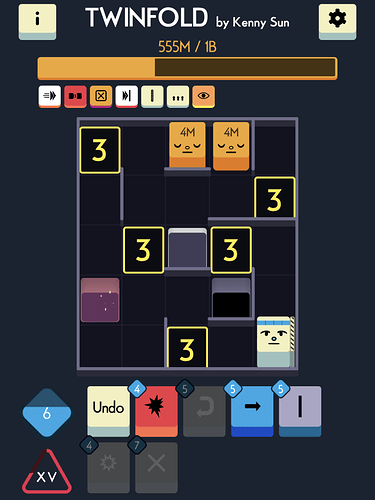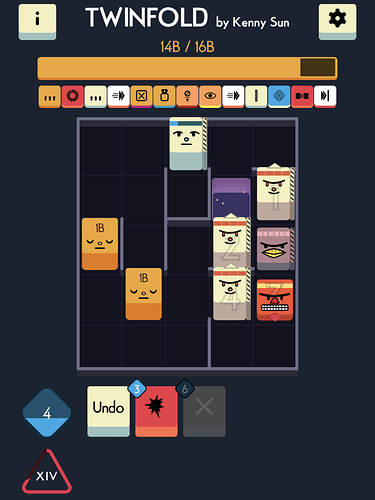Originally published at: https://statelyplay.com/2019/01/17/friggin-twinfold/
iOS, Android, PC/Mac
This is not even an attempt to be fair; it’s where I will put all of my hate for Twinfold so that I can return to folding twins unburdened. Let’s start at the very top, with the name, which suggests that “folding twins” ought to have been a sensible description of the main action of the game rather than a bizarre triumph of etymology over good sense. “Twinslide” would have killed you, Kenny?
Part of the problem is the instantly accessible design: attractive, simple, one-handable, with everything you want to know visible at all times and none of the hallmarks of excessive complication we see in so many games (slide-out trays of additional information, civilopedia-style reference works built into the menus, overcrowded interfaces). All of that, abetted by the first few minutes of play, conveys that this is a quick, pleasant, low-stakes time-waster. The trouble with that is that it doesn’t take that much skill to extend games beyond a few minutes. As your score rises and the enemies become more plentiful, Twinfold becomes intensely engaging and staying alive comes to feel important.
If I can take care of these five enemies, I’ll be 1/125th of the way to the next milestone!That’s no so bad on its own—indeed, I might well support luring players into well-designed games with more depth than they expect, thereby cultivating good taste and giving them a bit of salubrious cognitive exercise. But, like many rogue-likes, the duration of the game is wildly unpredictable. You might find yourself, an hour and a half after having sat down for a ten-minute diversion before bed, excitedly nearing your all-time high score and desperately needing to pee. Worse, the pace of the game begins to drag once three or more enemies spawn at once; as survival becomes more challenging, the expected rewards for risky play decrease. So the later game turns into a boring slog, because players usually have strong enough abilities that they can almost certainly stay alive, but must sacrifice speed of progression to do so. I intensely dislike games which incentivize playing so as to make the game tedious. Optimizing for fewest steps to each milestone addresses this problem, but putting the score (rather than steps) at the top of the screen discourages seeing that as the primary goal.
I’m grateful to Twinfold for encouraging me to rethink genres a little bit, because it really occupies a space I’m tentatively thinking of as the penumbra of rogue-likes. The themelessness is unusual, but a good run generally plays out in just a few sessions of substantial duration, and the decisions one makes about upgrades early on tend to be informed by the situations one tends to encounter later in the game. Consequently, a long run allows you to collect intelligence about how to prepare. Interestingly, I’m coming to think of Cinco Paus as another member of this penumbra. Part of its brilliance is its ability to create the impression that each set of five levels constitutes a game by resetting one of the two categories of tool. However, if you survive a set of five levels, you keep your gems, keys, and artifacts, and enemies continue to gain abilities. So, if we think of a game as everything that happens until you die, Cinco Paus has much the same unpredictability in its length as Twinfold, it just hides this better. But realizing how effectively Cinco Paus manages the practical problem of knowing how to fit a game into your life just makes the difficulties Twinfold poses in that realm all the more stark.
Also, these friggin’ guys.There are numerous other minor design choices I question: the existence of the white fubes [Stately Play’s first callback. I take back all those things I said about you, Kelsey. -ed.] which can doom you even at full health, balance issues with upgrades, the possibility of being offered sets of upgrades which offer only activated abilities which largely duplicate one’s existing options, the aforementioned focus on maximum score rather than fewest steps to forge each milestone (or total number of enemies killed, but I think I only like that one because I was at one point 24th on the high score list. I am apparently an unusually bloodthirsty Twinfolder). But none of them rise to the level of my dissatisfaction with the incentive to play slowly in the mid-game, and presumably beyond. Fortunately, now that I’ve written this, I’m already feeling more eager to play again.
Dave’s rebuttal: I like the sounds the gold fubes make.

